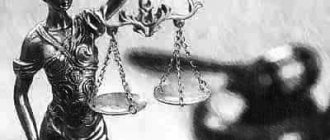The law of the Russian Federation states that every citizen who has reached the age of 18 becomes legally capable. Moreover, this procedure occurs by default, automatically and does not require any specific actions from a person. At the same time, in accordance with the same legislative norms, there are exceptions to this rule: the presence of certain diseases can cause a restriction of a citizen’s rights. As a rule, such diseases arise as a result of old age or mental disorders.
Since an unhealthy person can commit actions that could cause material or physical harm to both himself and others, he is recognized as incompetent. By law, such a person, regardless of his age, is appointed an official guardian. What can cause incapacity or limited legal capacity, how to recognize a citizen as incompetent and where to apply for this? Vladimir Atapin answers these and other important questions .
photo from the personal archive of Vladimir Atapin /
What is meant by capacity and incapacity?
Legal capacity is defined as a person’s ability to acquire and exercise civil rights as a result of his actions, as well as to form for himself and fulfill the duties of a citizen. A person becomes fully capable upon reaching the age of majority, and if he marries before reaching the age of 18, from the moment of marriage (according to Article 21 of the Civil Code of the Russian Federation). A citizen who is not able to realize his own actions, understand them and keep them under control, as well as manage them, can be considered incompetent.
Based on this formulation of the incompetent citizen, a certified psychologist or professional coach could say that almost 99% of people are incompetent who, without too much concern for the consequences, lead an unhealthy lifestyle, are nervous and irritated over trifles, are grumpy, envious and harmful both to yourself and to those around you. Therefore, both legal capacity and incapacity in the universal human sense are rather vague and subjective concepts. As a consequence, it is absolutely impossible to recognize a person as incompetent without a special legislative regime.
“By following the recommendations of doctors, you can extend the active phase.” Vladimir, 57 years old
“We noticed symptoms in March 2011, but in hindsight we realized that dementia had started to develop earlier. Six months before, she was bad at sewing, knitting, and cooking. But we didn't attach any importance to this. Then she began to get confused more than usual, making mistakes in the simplest things. Mom, of course, is an elderly person, but it became obvious to both me and my sister that something was wrong.
We didn't understand what was happening and took her to a neurologist. The doctor immediately said that my mother had dementia, possibly Alzheimer’s disease. She prescribed medications, injections and suggested specialists who deal with this problem in Moscow. The Scientific Center for Mental Health of the Russian Academy of Medical Sciences sounded. Department for the Study of Alzheimer's Disease and Associated Disorders. I found it. In the first months we managed to get an appointment. For the first five or six years we visited there regularly. They told me how to behave with my mother in everyday life, what to do with her.
The first years we lived actively. We did Nordic walking and played chess. We did everything together: shopping, eating, cleaning, even doing laundry together. We tried to communicate: we went to visit, we invited friends.
But this time quickly passed. Three years ago, my mother began to fall into delusional states, sleep poorly, and behave aggressively. She has required continuous monitoring for the last two years. We had to put locks on all the doors and windows and remove the handles from the stove. If I’m doing something, I look back at her every two or three minutes. Now my mother is bedridden. He speaks poorly and doesn't understand anything.
All the concern lies with me. At first I went to work, but then I had to leave everything. The situation was depressing. But over time, we got used to each other and managed. My sister is a visitor and comes when she can. I can do some things at this time. But since my sister, unlike me, is not constantly looming before my eyes, my mother does not perceive her well: she does not listen, she contradicts her.
My mother’s character changed a lot during her illness. She doesn't react well to all people, so we haven't thought about a caregiver. We did not consider boarding houses either. She is very restless, energetic, and difficult to keep track of. And a change of scenery wouldn't do any good.
Mom, of course, doesn’t realize much, but her native walls work better on her. Even when we first went to a relative’s dacha, she always asked to come back home. As we were told at the “School of Caring” and as I myself understood through experience, caring for such patients is still the business of relatives. Nothing can replace their help and care.
On the recommendation of the center’s specialists, we registered at the neuropsychiatric dispensary at our place of residence. The doctors sent me, saying that they could give me free medicine. But the necessary drugs were not available. We buy everything ourselves. We spend 5-7 thousand a month.
In my opinion, the most important thing is to notice in time, give importance to the changes and turn to specialists. Nothing good will happen if you leave things to chance. By following doctors’ recommendations, you can extend the active phase.”
For what purpose can a person be declared incompetent?
“First of all, declaring a citizen completely or partially incompetent is aimed at protecting him from his own actions that could harm him,” explained Vladimir Atapin. “It must be said that in our country, depriving relatives of legal capacity is generally not approved by society, because many people believe that the main motive for this is greed, the desire to appropriate the patient’s property: an apartment, a dacha, a car, and so on. However, in many cases, declaring a mentally ill person incompetent is the only way to reliably protect him from unscrupulous sales agents, realtors and other scammers. After all, only through restrictions on a citizen’s rights can he be prohibited from making certain transactions on unfavorable terms for him, and in some cases, even voluntarily transferring his expensive property to criminals, which he would never have carried out in his right mind. Therefore, by declaring your loved one incompetent, you can save his wallet and life.”
On what grounds can a person be declared incompetent?
The grounds for declaring a person incompetent are determined, in particular, by Article 282 of the Code of Civil Procedure of the Russian Federation, which states that there is only one reason for depriving a citizen of legal capacity - the presence of a serious mental disorder, which carries consequences in the form of an inability to manage his own actions. It is customary to distinguish several types of such diseases:
- mental illnesses that exist in a person from birth. A disabled child with such a disease upon reaching adulthood is subject to deprivation of legal capacity in accordance with the general procedure;
- mental disorders resulting from trauma. Most often, such deviations develop as reactions to brain injuries;
- mental diseases that arise and develop as a person approaches old age. For example, people often have to think about how to recognize an elderly relative as incompetent: this procedure can be initiated due to the development of senile dementia in the elderly.
pixabay.com/
Dementia - symptoms and treatment
Dementia is a syndrome that occurs when the brain is damaged and is characterized by impairments in the cognitive sphere (perception, attention, recognition, memory, intelligence, speech, ability to perform purposeful actions). The development and progression of this syndrome leads to disturbances in work and everyday (household) activities.
About 50 million people in the world suffer from dementia. Among the population over 65 years of age, dementia of varying severity occurs in approximately 20% of people (5% of the population has severe dementia) [3]. Due to the aging population, especially in developed countries, the issues of diagnosis, treatment and prevention of dementia are extremely pressing social issues. Already, the total economic burden of senile dementia is approximately $600 billion, or 10% of global GDP. Approximately 40% of dementia cases occur in developed countries (China, USA, Japan, Russia, India, France, Germany, Italy, Brazil) [10].
The cause of dementia is primarily Alzheimer's disease (40-60% of all dementias) [3]. Dementia can also be caused by vascular lesions of the brain, Pick's disease, alcoholism, Creutzfeldt-Jakob disease, brain tumors, Huntington's disease, traumatic brain injury, infections (syphilis, HIV, etc.), dysmetabolic disorders, Parkinson's disease, normal pressure hydrocephalus, etc. .
Alzheimer's disease
Alzheimer's disease (AD, senile dementia of the Alzheimer's type) is a chronic neurodegenerative disease. It is characterized by the deposition in neurons of the brain of extracellular plaques (senile plaques), consisting primarily of β-amyloid (Aβ) and neurofibrillary tangles. These formations lead to the death of the neuron with the subsequent development of cognitive dysfunction in the patient.
In the preclinical stage, there are almost no symptoms of the disease, however, pathological signs of Alzheimer's disease are noted, such as the presence of Aβ in the cerebral cortex, tau pathology (tangles of tau protein), and impaired lipid transport in cells. The main symptom of this stage is impaired short-term memory. However, very often forgetfulness is attributed to age and stress. The clinical stage (early dementia) develops only 3-8 years after the beginning of an increase in the level of β-amyloid in the brain [2].
Early dementia occurs when synaptic transmission is disrupted and nerve cells die. Memory deterioration is accompanied by apathy (indifference), aphasia (impaired speech), apraxia (impaired purposeful movements and actions), and impaired coordination. Criticism of one's condition is lost, but not completely.
In the stage of moderate dementia, there is a pronounced decrease in the patient’s vocabulary. Writing and reading skills are lost. At this stage, long-term memory begins to suffer. A person may not recognize his acquaintances, relatives, “live in the past” (memory deterioration according to “Ribault’s law”), and may become aggressive and whiny. Coordination also deteriorates. Criticism of one's condition is completely lost. Urinary incontinence may occur.
Vascular dementia
Causes 15% of all dementias. It develops as a result of atherosclerosis of cerebral vessels, hypertension, blockage of a vessel by an embolus or thrombus, as well as systemic vasculitis, which subsequently leads to ischemic, hemorrhagic and mixed strokes.
Pick's disease
Causes dementia in approximately 1% of cases. Pick's disease is a chronic disease of the central nervous system characterized by isolated atrophy of the cerebral cortex, most often of the frontal and temporal lobes. In the neurons of this area, pathological inclusions are found - Pick bodies. This pathology develops at 45-60 years of age. Life expectancy once the disease is detected is about 6 years.
Creutzfeldt-Jakob disease
Creutzfeldt-Jakob disease (“mad cow disease”) is a prion disease that is characterized by pronounced dystrophic changes in the cerebral cortex. Prions are special pathogenic proteins with an abnormal structure that do not contain a genome. When they enter a foreign body, they form amyloid plaques, which destroy the normal structure of the tissue. In the case of Creutzfeldt-Jakob disease, they cause spongiform encephalopathy.
Dementia in HIV-infected people
Develops due to the direct toxic effect of the virus on neurons. The thalamus, white matter, and basal ganglia are predominantly affected. Dementia occurs in approximately 10-30% of those infected.
How can a person be declared incompetent?
Guided by paragraph 1 of Art. 29 of the Civil Code of the Russian Federation and Part 2 of Art. 281 of the Code of Civil Procedure of the Russian Federation, in answer to the question of how to recognize a person as incompetent and where to start in order to initiate this procedure, it should be said that only the court is the body that recognizes a citizen as incompetent - the basis for this is the statement of a loved one or a medical organization. At the same time, a citizen in respect of whom a procedure for deprivation of legal capacity is planned does not have the right to come to court with a statement declaring himself incompetent - the law does not provide for this.
There are many judicial bodies. So what kind of court can declare a citizen incompetent?
“The application is submitted to the district court of general jurisdiction, which is located at the place of residence of the person declared incompetent. Also on the basis of Part 4 of Art. 281 of the Code of Civil Procedure of the Russian Federation, you can submit it at the location of the psychiatric institution or psychoneurological boarding school in which the citizen is placed,” Vladimir Atapin clarified.
In the application, you must indicate the grounds on which the citizen should be deprived of legal capacity - that is, confirm the official presence of a mental disorder. In addition to applying to the court in order to declare a loved one incompetent, you will also need to collect and provide the following documents and attachments:
- certificates from the registry office that confirm the applicant’s family relationship with the person in respect of whom the application was written;
- a psychiatrist’s report, a certificate from a psychoneurological institution, a certificate of disability due to a mental disorder, and so on;
- petition for a forensic psychiatric examination;
- requests for medical documents, which can only be provided upon an official request from a judicial authority;
- a receipt for payment of the state duty or a petition to reduce its amount, grant a deferment, and so on;
- notification of delivery of copies of all attached documents to persons participating in the case.
pixabay.com/
Is it necessary to recognize incapacity when registering a disability of group 1 with a diagnosis of dementia?
Good afternoon. Is it necessary to recognize incapacity when registering a disability of group 1 with a diagnosis of dementia?
Lawyer Antonov A.P.
Good afternoon
According to Article 29 of the Civil Code of the Russian Federation, a citizen who, due to a mental disorder, cannot understand the meaning of his actions or control them, may be declared incompetent by the court in the manner established by civil procedural legislation. Guardianship is established over him. On behalf of a citizen declared incompetent, transactions are carried out by his guardian, taking into account the opinion of such a citizen, and if it is impossible to establish his opinion, taking into account information about his preferences received from the parents of such a citizen, his previous guardians, other persons who provided services to such a citizen and in good faith fulfilled their duties. When developing the ability of a citizen who has been declared incompetent to understand the meaning of his actions or to manage them only with the help of other persons, the court recognizes such a citizen as having limited legal capacity in accordance with paragraph 2 of Article 30 of this Code. When restoring the ability of a citizen who has been declared incompetent to understand the meaning of his actions or direct them, the court recognizes him as competent. According to Article 1 of the Federal Law “On Social Protection of Disabled Persons in the Russian Federation,” a disabled person is a person who has a health disorder with a persistent disorder of body functions, caused by diseases, consequences of injuries or defects, leading to limitation of life activities and causing the need for his social protection. Based on a court decision, the guardianship established over the citizen is canceled and, if the citizen is recognized as having limited legal capacity, guardianship is established. Incapacity and disability are different statuses; they can be obtained independently of each other. Registration of disability is necessary to receive payments and other social benefits, and recognition as incompetent is so that the person’s relatives can take care of him and to protect the person from the consequences of his behavior.
Sincerely, lawyer Anatoly Antonov, managing partner of the law firm Antonov and Partners.
Still have questions for your lawyer? Ask them right now here, or call us by phone in Moscow +7 (499) 288-34-32 or in Samara +7 (846) 212-99-71 (24 hours a day), or come to our office for a consultation (by pre-registration)!
Can a minor be declared legally incompetent?
Both adult citizens and minor children aged 14-18 years, including those who acquired legal capacity as a result of marriage or emancipation (Article 27 of the Civil Code of the Russian Federation “Emancipation”) can be officially recognized as incompetent. Recognition of the incapacity of a minor citizen is carried out according to a similar algorithm.
Until the age of 14, a child cannot be declared incompetent, since at this age he has the right to make only minor transactions, and therefore will not be able to cause serious damage to himself.
What is the difference between incapacity and limited legal capacity?
You should know that the existing procedure for declaring a person incompetent does not apply to persons suffering from alcohol or drug addiction, pathological gambling, and so on. For dependent people, the law establishes a special judicial procedure for partial incapacity. At the same time, the restrictions on the legal capacity of such citizens differ significantly both from the point of view of the judicial process and from the consequences of these restrictions.
In the first case, the differences lie in the fact that the guardianship and trusteeship authority may also take part in the case of limitation of legal capacity. If it is necessary to prove the fact of a person’s addiction, then a psychiatric examination is not necessary - other evidence will be sufficient, including testimony of witnesses, a certificate from a drug treatment clinic, and so on.
“As for the legal consequences, only a guardian has the right to carry out various transactions on behalf of an incompetent person, while a citizen with limited legal capacity is allowed to carry out everyday transactions of an insignificant scale, but he can carry out all other transactions only with the consent of the trustee. In addition, a person with limited legal capacity bears all property liability for this, as well as for the harm he causes both to himself and to other people,” added our expert.
Evidence base on the fact of a person’s inability
In court, and only in court, you can petition to declare a person incompetent after a stroke. At the meeting, it is necessary to prove through documents that the elderly person really needs guardianship; he cannot give an account of his actions. At the same time, the loss of common sense or the ability to provide for oneself independently in care and nutrition should not be temporary, but permanent.
That is, if a person sometimes does not understand what he is doing, or does not remember himself in a certain time period, and then thinks sensibly and fully understands his actions, this is not a basis for declaring a citizen incompetent after suffering a stroke. In judicial practice, there are cases when a person himself gave consent to the transfer of his rights to guardians.
To submit documents to the court, you must attach to the statement of claim:
- An extract from the sick leave certificate, which will indicate that the person was indeed admitted to hospital due to a stroke.
- A certificate from the attending physician who will indicate the nature of the symptoms of the disease.
- Petition to request documentation for judicial review.
The latter may be necessary to declare an elderly person incompetent for the guardianship authorities. After a stroke, some people are taken to nursing homes and, if there are relatives or people willing to take care of the patient, additional documents are needed. Also, the guardianship and trusteeship authority itself may request documents to formalize guardianship over the person in order to provide a nurse in the future. Only after the court receives all the documents will an examination of a living person be ordered.
Is it possible to recognize a person as legally incompetent after his death and why might this be necessary?
Yes, it is possible to posthumously declare a person incompetent. Most often this happens in the course of challenging transactions made by the deceased - for example, a will, a gift agreement, a sale and purchase, and so on.
“However, this is a very difficult procedure that requires a lot of serious evidence - written documents, protocols of interrogation of witnesses, video and audio recordings, and the like, on the basis of which a specialist can perform a post-mortem examination and make a fair conclusion,” noted Vladimir Atapin.










